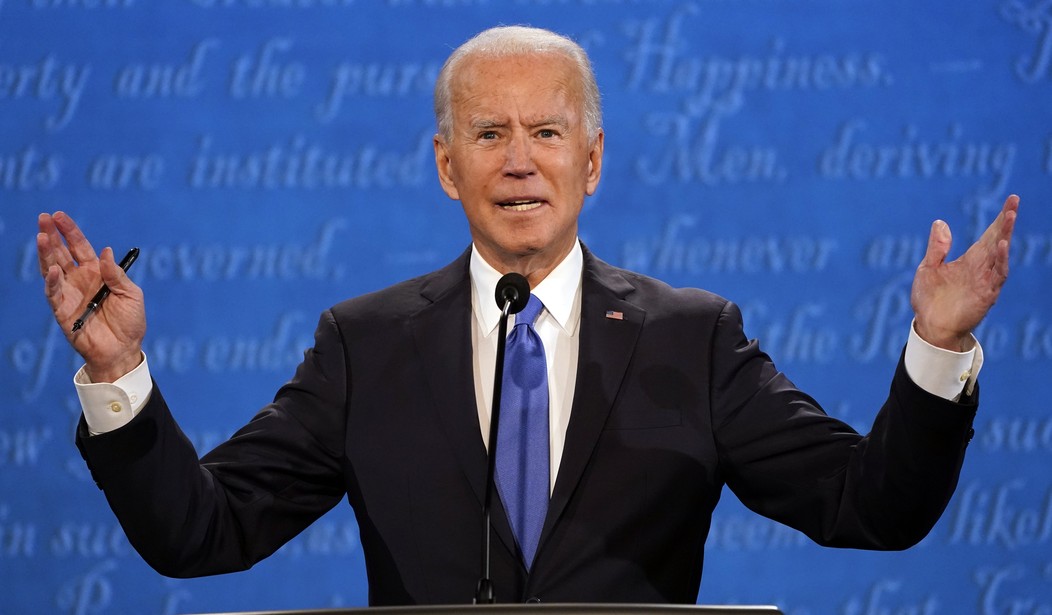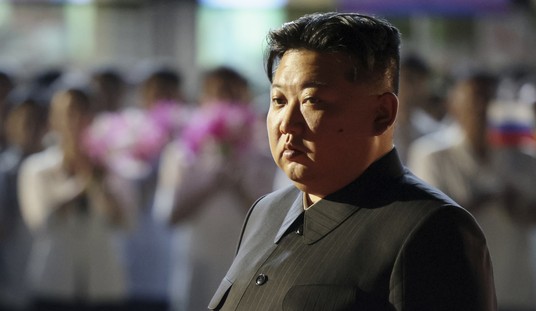Did the United States really have a good relationship with Adolf Hitler before he started World War II? Joe Biden made this bizarre claim during Thursday’s debate with President Trump. Trump said of North Korea’s Kim Jong Un: “North Korea, we’re not in a war. We have a good relationship. People don’t understand. Having a good relationship with leaders of other countries is a good thing.”
Biden shot back: “We had a good relationship with Hitler before he, in fact, invaded Europe, the rest of Europe. Come on.”
Come on, Joe! The U.S. didn’t have a good relationship with Hitler before he “invaded Europe. The German dictator was, however, beloved in certain quarters, including the editorial offices of the New York Times.
President Franklin Delano Roosevelt didn’t attack Hitler directly before the war began, but relations between the U.S. and Nazi Germany were by no means good. In September 1938, Roosevelt sent a telegram to Hitler lecturing him about the importance of keeping the peace and stating: “The conscience and the impelling desire of the people of my country demand that the voice of their government be raised again and yet again to avert and to avoid war.” Implying that Hitler was a warmonger was hardly a hallmark of cordial relations between the two countries.
Failing to get a satisfactory response from Hitler, on October 11, 1938, Roosevelt announced that he was increasing national defense spending by $300 million (over $5 billion in today’s dollars). No one thought that money was going to build up our defenses against Britain and France.
Some in America, however, loved the Führer.
The historian Rafael Medoff recently noted that on July 9, 1933, just over five months after he became Chancellor of Germany and years after his virulent anti-Semitism and propensity for violence had become notorious worldwide, the New York Times published a fawning puff piece on Hitler that rivals even today’s media adulation of Joe Biden, Kamala Harris, and Nancy Pelosi in its one-sidedness, myopia, and disdain for essential facts.
Pulitzer Prize-winning “journalist” Anne O’Hare McCormick traveled to Berlin to become the first reporter from an American news outlet to interview the new chancellor, and she was an intriguing choice for the Times editors to make to conduct this interview, as in the presence of this man whose name has become justly synonymous with evil, she was decidedly starry-eyed: “At first sight,” McCormick gushed, “the dictator of Germany seems a rather shy and simple man, younger than one expects, more robust, taller. His sun-browned face is full and is the mobile face of an orator.”
As if that weren’t enough, she continues with a description of the Führer as outlandish and adulatory as likening the supremely zaftig Stacy Abrams to a supermodel: “His eyes are almost the color of the blue larkspur in a vase behind him, curiously childlike and candid. He appears untired and unworried. His voice is as quiet as his black tie and his double-breasted black suit.”
McCormick labored to portray Hitler as more modest than his public persona might suggest: “In the country he has plastered with banners and insignia he wears only a small gold eagle in his buttonhole. No flag or swastika is in sight.” He is also, she signaled to her readers, reasonable and genuine: “He begins to speak slowly and solemnly but when he smiles — and he smiled frequently in the course of the interview — and especially when he loses himself and forgets his listener in a flood of speech, it is easy to see how he sways multitudes. Then he talks like a man possessed, indubitably sincere.” What’s more, “Herr Hitler has the sensitive hand of the artist.”
The intrepid New York Times reporter doesn’t seem to have asked Hitler if he had a significant other, but no one would have been surprised after reading all this if the two of them had become an item.
However, McCormick’s interview was not all about Hitler’s sun-browned face and blue larkspur eyes. In the 29th paragraph of a 41-paragraph article, she recounts that she asked him: “How about the Jews? At this stage how do you measure the gains and losses of your anti-Semetic [sic] policies?” Hitler answered, she said, with “extraordinary fluency,” and she records his answer – a tissue of victim-blaming and excuse-making – at considerable length.
Then, McCormick recounts, “seeing the second part of the question was not going to be answered, your correspondent referred to the position of women.” Ah, yes: when the interviewee doesn’t want to answer the tough question, go on to something easier. The Times and its allies today always keep this in mind when interviewing Democrats. This surrender mollified Hitler as well: “Herr Hitler’s tension relaxed. He smiled his disarming smile.”
Little did Anne O’Hare McCormick realize, as Hitler’s blue larkspur eyes twinkled in her direction and his disarming smile made her heart flutter, that all these years later, the New York Times would still be publishing puff pieces about authoritarian thugs. And old Joe Biden, as he contemplates the approaching end of the presidential race from his Delaware basement, can rest secure in the certainty that no matter what outrageously false or crazy thing he says, that same New York Times will cover for him, too.
Robert Spencer is the director of Jihad Watch and a Shillman Fellow at the David Horowitz Freedom Center. He is author of 21 books, including the New York Times bestsellers The Politically Incorrect Guide to Islam (and the Crusades) and The Truth About Muhammad. His latest book is Rating America’s Presidents: An America-First Look at Who Is Best, Who Is Overrated, and Who Was An Absolute Disaster. Follow him on Twitter here. Like him on Facebook here.
Slate Wants You to Think Columbus Was ‘Driven by Islamophobia’










Join the conversation as a VIP Member